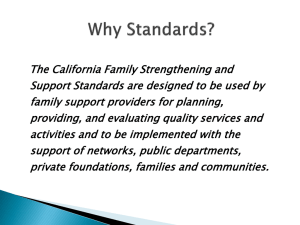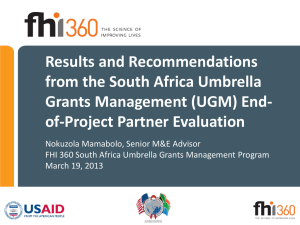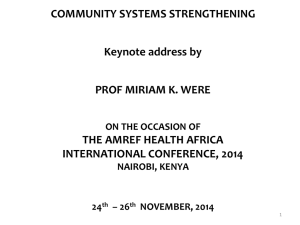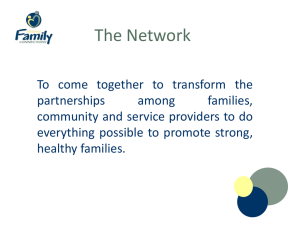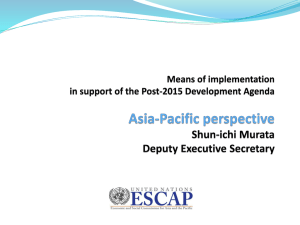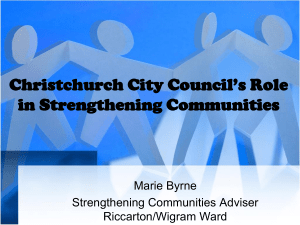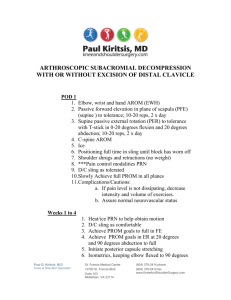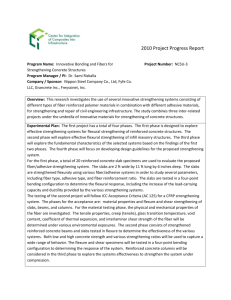32nd ACHR_DRD PRESENTATION Oct
advertisement
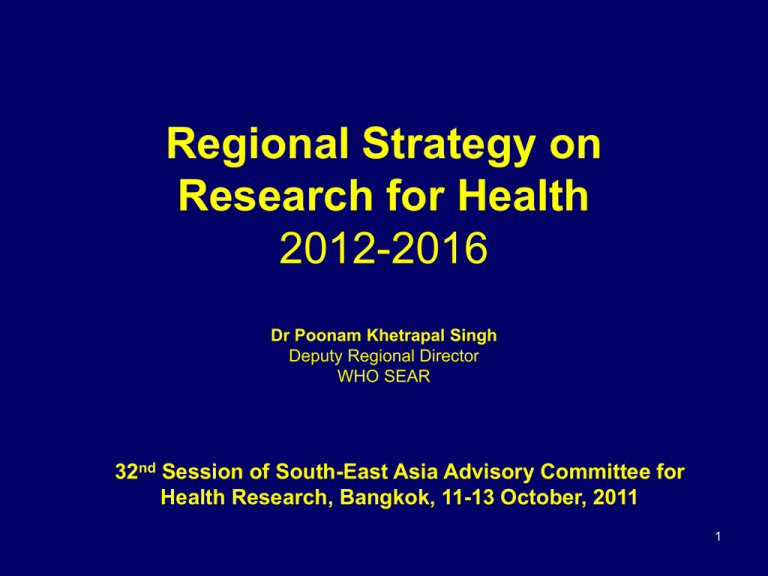
Regional Strategy on Research for Health 2012-2016 Dr Poonam Khetrapal Singh Deputy Regional Director WHO SEAR 32nd Session of South-East Asia Advisory Committee for Health Research, Bangkok, 11-13 October, 2011 1 From Health Research to Research for Health • • • • November 2008: Bamako Global Ministerial Forum on Research for Health embryo of Research for Health July 2009: 31st SEA ACHR recommended to develop Regional Strategy on Research for Health May 2010: 63rd WHA adopted a resolution on WHO Strategy on Research for Health July 2011: the final draft of the Regional Strategy on Research for Health was discussed and finalized at the Regional consultation in Kathmandu. 2 Research for Health Seeks to: • • • Understand the impact on health of policies, programs, actions, events in non health sectors Assist in developing interventions to prevent or mitigate that impact Accelerate the achievement of MDGs, Health equity and HFA 3 Research for Health Encourages partners and stakeholders to : Harness the potential of research to address priority health challenges Mobilize around an agenda of research to improve the performance of health systems based on PHC Link to recommendations of the WHO Commission on Social Determinants of Health Link to Global Strategy and Plan of Action on Public Health, Innovation and Intellectual property Rights as recommended by CIPIH, IGWG and CEWG Source: EB124/12 Add.2, Bamako Global Ministerial Forum on Research for Health, Report by the Secretariat, page 5 4 Research for Health • Spans the five generic areas of activity: Measuring the magnitude and distribution of health problems Understanding the diverse causes of health problems Developing interventions to prevent or mitigate the problems Implementing solutions through policies and programmes Monitoring and Evaluating the impact of these solutions. 5 Research for health beyond the health sector Examples of collaboration with non health sectors • • • • Zoonoses: Veterinary Sciences, Agriculture, Animal Husbandry, Animal Health Laborataries SARS, Avian Influenza, Rabies Climate change: Environment, Water, Sanitation, Education, Industry, Local Govt, Increased incidence of water and vector borne diseases Traffic accidents and injuries: Transport, PWD, Urban Development, Police, Education Physical impairments and disabilities due to accidents Health Equity: Social, economic, cultural and behavioral research to identify barriers in accessing Health for All 6 Research for Health Another example • NCDs: Multisectoral Research on the four primary risk factors - unhealthy diets - lack of physical activity - harmful use of alcohol - tobacco use • • Issues of poverty that relate to the increased incidence of NCDs - Economic sectors and Socio Behavioral sciences Gender role towards effective prevention of risk factors of NCDs: Social Welfare, Women’s Affairs, Education, Rural Development, Culture, Anthropology Source: A prioritized research agenda for prevention and control on NCDs, WHO 2011 7 Multidisciplinary research is imperative for addressing non communicable diseases Social Urban development Cardiovascular Tobacco use disease Unhealthy diet Cancer Physical Prevention and Diabetes inactivity Control of NCDs Chronic lung Harmful use disease of alcohol Transport Food/ Agriculture Education Economic 8 The Guiding Principles of Research for Health • • • Quality Scientific merit, efficient, effective, expertly reviewed Ethical Monitored and evaluated Impact Potential to attain health related development, health equity and MDGs Inclusiveness Partnerships with stakeholders - other sectors, research community, non governmental organizations, civil society, governments, development and donor agencies Source:Annex, WHO Strategy on Research for |health , doc A63/22 9 Vision and Mission Vision Evidence from research is the basis for strengthening national health policies, strategies and plans to achieve Health for All (HFA) and other health related Millennium Development Goals (MDGs) Mission Member countries in collaboration with WHO and development partners in research work together to harness science, technology and broader knowledge in producing research-based evidence and tools 10 Goal and Objectives Goal To assist member countries in strengthening research capacity for achieving the national health and international health goals Objectives Provide a generic framework to formulate strategies towards strengthening national health research Strengthen national health research policy and setting health research priorities Develop capacity of human resources Develop solutions for current operational issues and challenges in specific health programmes Address policy questions in health systems reform 11 CONCEPTUAL FRAMEWORK: STRATEGIC DIRECTIONS FOR RESEARCH FOR HEALTH Politics Economics Education Nutrition Culture Social Issues • Weak health systems •Insufficient health research • Lack of evidence based policy making •Inadequate protection of human participants •Inadequate resources for research Agriculture Challenges •More evidence for health system based on PHC •Strengthening national health research •Bridging gap between research and policy making •Improving ethics in research •Enhance and sustain resources for research for health •Promoting and Strengthening multisectoral research in health 1. 2. 3. 4. 5. 6. Strategic Directions Prioritization for research for health Capacity building in health research Research ethics Management of research for health Managing research knowledge to bridge the research-policy gap Monitoring and evaluation of research for health Output •Strong and functioning national health research •Evidence based policy for effective and efficient Health systems Outcome Accelerations of efforts to achieve MDGs and Other Development Goals 12 July 14,2011 Issues and Challenges in Research for Health Issues • • • • • Weak health systems • Insufficient capacity of health research • Lack of evidence based policy making • Inadequate protection of human participants • • Inadequate resources for research • Challenges More evidence for health systems Strengthening national health research Bridging gap between research and policy making Improving ethics in research Enhance and sustain resources for research for health Promoting and Strengthening multisectoral research in health 13 Strategic Direction 1 Prioritization of research for health • • • Inclusion of priorities in the national health research policy One size does not fit all --> Member States to use prioritization tools/ models to suit their needs Areas of research that can be prioritized: Health problems Health Systems strengthening based on PHC Global Strategy and Plan of action - Intellectual Property Rights, Innovation and Public Health Social Determinants of Health 14 The Primary Health Care Reform Four areas of reform in PHC for strengthening health systems: 1. 2. 3. 4. Service delivery: to have people-centered health services –respond to people’s needs and expectations Universal coverage: to ensure health systems respond to health equity, social justice and end of exclusion Leadership: to encourage inclusive, participatory, negotiation based leadership of the government Healthy Public policies: to have health in the policies across sectors and strengthening public health interventions World Health Report 2008 Primary Health Care 15 Iceberg of health problems Research for health aims to “demistify” the unknown and unseen health problems 16 Strategic Direction 2 Capacity Building • • • • • Develop a comprehensive human resource plan at the country level in keeping with National Health Research Policy Strengthen both demand and supply side Enhance institutional and individual capacities in preparing good quality research proposals based on sound research methodology Develop technical content based on varying needs (research management, research ethics, scientific writing, dissemination) Promote Twinning mechanism through horizontal collaboration Bhutan-India, Maldives-Srilanka, and Timor-Leste-Indonesia 17 Strategic Direction 3 Research Ethics • • • • • Ethical review to be mandatory Ethical Review Boards (ERBs) to be in position in all research institutes in the country Capacity of ERB members in research ethics be enhanced Uniform curriculum on research ethics for different target groups be developed Standard Operating Procedures and Guidelines for dealing with unethical practices be formulated 18 Strategic Direction 4 Enhance management • • • • Improve stewardship in research for health at the institutional, national and regional level Enhance cost efficiency in conducting research by avoiding duplication Create partnerships with clear role and functions Pool donor commitments to maximize resources 19 Strategic Direction 5 Bridge the research– policy gap • • • • • • Improve access to Research links and connections through maximum use of existing information technology Capacity building in analysis and transfer of knowledge to policy Create forum for researcher-policy maker interface Use of media as vehicle for influencing policy makers Use of network among researchers, policy makers and society for advocacy More publications and dissemination of research 20 findings for building awareness Strategic Direction 6 Monitoring and Evaluation Two levels of monitoring and evaluation: • • • At the Strategic Direction level Relevant indicators to measure success in achieving Outputs of each Strategic Direction Strengthening national health research as a whole Relevant indicators to measure success of Strategic Directions as a whole to strengthen national health research Feedback mechanism at both levels of M and E 21 THANK YOU 22
